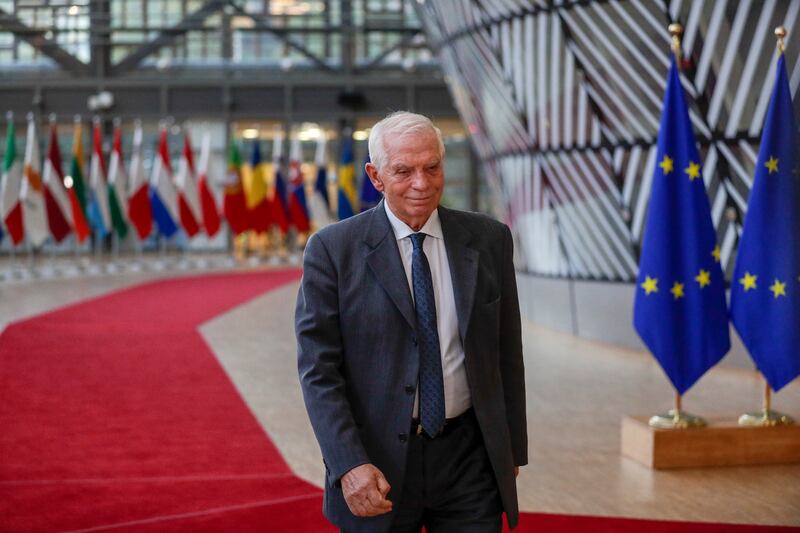The European Union's 27 foreign ministers on Monday approved a second round of sanctions in less than a month against Iranian officials involved in the brutal repression of protesters.
The sanctions are targeted "against the people responsible for the repression of the demonstrators", said the EU's Josep Borrell ahead of the announcement.
"Foreign ministers adopted further sanctions against 29 individuals & 3 entities in #Iran due to their role in the death of #MahsaAmini and the violent response to ongoing demonstrations," tweeted the Czech presidency of the EU.
The identity of those targeted is expected be made public on publication in the EU's official journal later on Monday.
Meanwhile, French President Emmanuel Macron said on Monday the West should step up sanctions against Iran by targeting government officials who are part of the violent crackdown.
Tens of thousands of people across France and Europe have marched in solidarity protests with rebelling Iranians, demanding freedom for women and an end to the compulsory headscarf. French music and film stars, including two Oscar-winning actors, Marion Cotillard and Juliette Binoche, filmed themselves chopping off locks of their hair in support of protesters in Iran.
“Women in Iran fight this fight with exceptional courage under the threat to their lives and the lives of their loved ones,” Mr Macron told public radio FranceInter in a broadcast on Monday.
Their rebellion against the cleric-led state has “burst the ideological bubble” that Tehran has been sending to the world, Mr Macron said, namely that women there “were somehow happy to live in this constant state of obstruction”.
The ongoing protests of young Iranians born after the 1979 toppling of the monarchy who have only lived in the Shiite cleric-led state has proven them wrong, Mr Macron said.
“The grandchildren of the (Islamic) revolution are leading a revolution against that revolution,” he said.
He added that the West needs to support them in their struggle, including by toughening European sanctions targeting the Islamic Revolutionary Guard Corps.
“I am in favour of a strong diplomatic reaction and sanctions on the regime’s personalities who are responsible for the repression of this revolution,” Mr Macron said.
So far, 336 demonstrators have been killed in the unrest and nearly 15,100 detained, the activist HRANA news agency says.
Public outrage over the death of Mahsa Amini, 22, who was in custody of Iran's morality police for allegedly not wearing the hijab properly, has transformed into demands for an end of the hardline interpretation of Sharia under supreme leader Ayatollah Ali Khamenei.
On October 17, Brussels imposed a first round of sanctions on 15 Iranian officials and state entities, including Information Minister Issa Zarepour, for restricting access to the internet, as well as Iran’s law enforcement forces for their involvement in deadly clashes with protesters.
Tehran reacted with counter-measures and sanctioned MEPs as well as journalists, human rights defenders and institutions.
The EU's top diplomat Mr Borrell on Monday said such retaliatory action was to be expected. “I think it’s a mistake, in particular to sanction parliamentarians for doing their job,” he said.
Mr Borrell said he had spoken on Sunday to his Iranian counterpart Hossein Amirabdollahian.
The two diplomats discussed the ongoing protests, Iran's military support to Russia, and the Joint Comprehensive Plan of Action, the nuclear deal struck in 2015 between Iran and world powers that eased sanctions on Tehran in return for curbs on its nuclear programme.
“We discussed JCPOA, we discussed the military support of Iran to Russia," Mr Borrell said. "That has to stop.
“JCPOA is about Iran becoming nuclear and the best way for Iran to not become nuclear is to continue work on the JCPOA.”
Mr Borrell is co-ordinating talks aimed at reviving the deal.
Iran said it had agreed to a visit by the UN’s nuclear watchdog this month. The group suspects Iran is expanding its production of enriched uranium above levels prohibited under the abandoned 2015 deal.
In a separate move, the EU imposed sanctions on Iran on October 20 over its supplying of drones to Russia to use in its war against Ukraine. Media reports also claim that Iran is sending ballistic missiles to Russia.
Questioned by The National, Mr Borrell said there was “no evidence about missiles but clear evidence about drones”. A senior EU official said last week that Brussels was working on independently verifying such reports.
Estonian Foreign Affairs Minister Urmas Reinsalu said that Ukraine had told EU officials that Iran had transferred ballistic missiles to Russia.
"We have to take seriously Ukrainian warning and take all capabilities EU countries have to share information and make [an] intelligence assessment in that matter," he said.
Should such missiles transfers be true, Brussels should sanction Iran again with a "far more damaging sanctions mechanism" than the "symbolic sanctions" adopted on October 20 over drones, said Mr Reinsalu.






